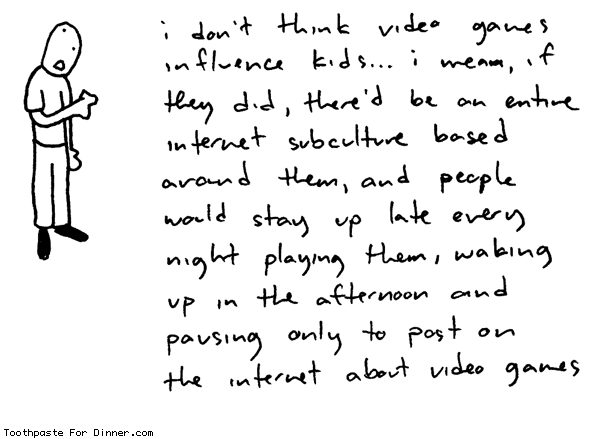We've all seen it happen before; a magnificent game comes out of nowhere, holds our game systems hostage, and after the requisite 2 year wait, the sequel feels flat and uninspired. The most obvious and glaring example of this, oddly enough, it is a truly beloved game. You all know it, even Bungie's said it. Halo 2.
Bungie engineer Chris Butcher was blunter in his assessment. "We had about four to five weeks to polish Halo at the end...[but] we had none of that for Halo 2," he told [British game magazine Edge]. "We miscalculated, we screwed up, we came down to the wire and we just lost all of that. So Halo 2 is far less than it could and should be in many ways because of that. It kills me to think of it."
Butcher was even critical of Halo 2's multiplayer element. "Even the multiplayer experience for Halo 2 is a pale shadow of what it could and should have been if we had gotten the timing of our schedule right," he said "I ****ing cannot play Halo 2 multiplayer. I cannot do it."
So what happened? How could a game that had (save a few last weeks) all the time in the world and an incredible base to build from turn out to be so uneven? Halo: CE
was the Xbox. There is a real chance that the system might have failed if not for Halo: CE. So what happened?
Halo 2 is the highest profile example of the sophomore slump in videogames, something I've decided to call the
software slump. But now that I've got a cute little moniker for this phenomenon, I'm obligated to explain it.
Damn.Crackdown inspired this post, along with the above quotes. Crackdown is incredibly fun to play around with, but at times it feels like some things were left out. Some are basic features that have been left out, possibly due to technical concerns (split screen deathmatch and coop), and others are finer elements of story and depth (more collectible weapons / cars / gear). What I see when I look at Crackdown is a game that should have a tremendous sequel, and that has a lot to do with the fact that it was lacking in the ways I described.
Halo: CE had none of these problems; the game was fully featured and the plot was fairly inventive. It played perfectly, and had very solid balance both in single player difficulty and in multiplayer -- well, you've played it. It was a great game in its own right, so how did the sequel go so wrong?
Don't misunderstand me, I enjoy Halo 2, and still play occasionally. But now that both Halos are 'last-gen,' I don't feel the overwhelming need to play the newer game over the older, and so I find myself suggesting Halo: CE at least as often as Halo 2, especially if we're going to play coop. Halo 2 missed the mark
- On plot - With the mostly horrible Arbiter sections and the ending
- On weapon balance - gimping the shotgun, plasma and magnum pistols, adding the tracking feature to the rockets while removing the fuel rod from the Banshee and slowing down the Wraith, and (though it's my favorite thing in the game) adding the unstoppable energy sword
- On the campaign - by changing the nature of the game and making Legendary difficulty unsatisfying and aggravating in coop, rather than the joy it was in the first game
They added some nice features too. Though I complain about the sword, like I said, I love it so hard, and having it available to the enemy in Halo: CE but not to the player seemed very unfair. Same thing for the Wraith tank, and while I'm on that point, vehicles should be destructible as they are in Halo 2. Dual wielding was overdue and pulled off well.
I think the trouble was that the team got wrapped up in all the new features they were adding to the game and missed the bigger picture. Often times these new features only served to throw off the balance in matches. I think that the story in the game was beyond salvation, but multiplayer was not. Halo 2 multiplayer was fun, but always seemed a bit too chaotic, and never approached the ballet-like matches I remember from Halo: CE. Furthermore the removal of the health gauge in addition to the shield was a terrible decision. Having two levels of life, one that dynamically recharges and the other that could only be revived by a power-up, makes for more strategic matches. Would I assault a superior foe with my spawn guns if I knew I could knock his health down halfway and I could keep him from reaching the health kit on my next life? Do I pick up the health and expose myself to potential ambush? With the addition of so many new weapons to Halo 2, most of which are not expressly superior to any others, there is little interest in setting traps or stalking a player - simply blast away at the next body you see.
Maybe these aren't the problems that Chris Butcher of Bungie was referring to above. Maybe I haven't even noticed what he things makes Halo 2 unplayable. However, these are the problems I see, and they came about because Bungie put too much into features at the cost of the balance and playability of the game.
Crackdown is at the other end of this spectrum. The basic structure of the game is fantastic, but it is almost criminally lacking in features. Split-screen coop is mandatory, period. Even minigames in split-screen, like the already included rooftop races, or see who can throw a body the farthest or juggle it the longest with rockets, or who can kill the most civilians or gang members in a time limit or with a single life. The game also begs for deathmatch, with a redesign in the aiming system (and the ability to hit something you're not locked on to).
A plot, even something as cliche-ridden and bland as Saint's Row would be greatly welcomed, and the fact that you're cloned every time you die could actually be used to write a Phillip K Dick-esque story around. The game bursts with potential. Bosses could use giant mechs, or use similar superhuman powers to the main character, or even use parts of the environment to attack you.
The eventual question I'm pushing towards is -
Will a game with tremendous potential, but lacking in features and depth(Crackdown) spawn a better sequel that a game that achieves everything it set out to do right out of the gate(Halo: CE)? A lot depends on the development team, but sometimes it takes drastic changes in focus to make a sequel work for a great game.
The series that jumps to mind as the perfect example of a team trying to make a sequel to a great game, once meeting with success, once with failure, is the trio of GoldenEye 007 / Perfect Dark / Perfect Dark Zero. GoldenEye and Perfect Dark were both smash successes, and PD:Z was sloppy at best. I had tremendous expectations for the PDZ, as PD is in my top 5 games of all time, but besides next-gen graphics the game had little going for it.
I believe that Perfect Dark was able to capitalize on GoldenEye's success without succumbing to software slump because they found features that gamers wanted and needed and implemented them without destroying the balance in the original game. I think losing the Bond license might have been the best thing that happened to PD, since it forced Rare to think of how to pull gamers in without the heavyweight tie-in. This change in focus brought enough freshness to the title to keep us happy without changing the basic feel of the game. This is where Halo 2 stumbled - they lost the feel of the original in pursuit of adding new features and items to the game.
I guess in a few years, we'll know if Crackdown 2 winds up better than Halo 2. I wouldn't hold my breath, since most developers either don't think like me, or find it too hard to code some of the ideas I've laid forth for the game. Still, it's interesting to see that success can sometimes come from mediocrity, and that brilliant success can sometimes lead to lackluster production. Hopefully this won't afflict some of the top tier games right now that are clearly going to get sequels, (Gears of War, Zelda, Resistance) but if it got hold of Halo: CE, then what game is truly safe?






